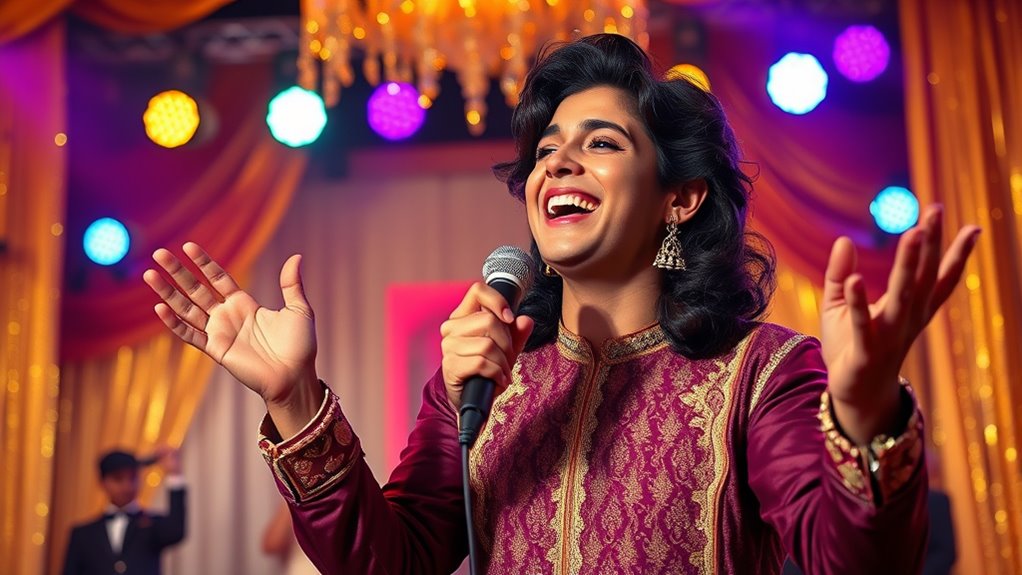Many iconic Bollywood actors started as singers, blending music and acting seamlessly. Stars like Kishore Kumar, KL Saigal, Suraiyya, and Noor Jehan initially gained fame through their singing talents before shifting to acting roles that made history. Today, artists like Ayushmann Khurrana and Farhan Akhtar continue this legacy with versatile careers. If you’re curious about how these talented individuals balanced both worlds and transformed the industry, there’s plenty more to explore.
Key Takeaways
- Several renowned singers like Kishore Kumar and Noor Jehan transitioned into successful Bollywood acting careers.
- Singers such as Aamir Khan and Ayushmann Khurrana leveraged their musical talents to enhance their acting roles.
- The dual expertise in music and acting has historically boosted artists’ popularity and industry opportunities.
- Suraiyya and KL Saigal are iconic examples of singers who became legendary film actors in early Indian cinema.
- Modern artists like Farhan Akhtar and Shah Rukh Khan demonstrate the ongoing trend of singer-actors shaping Bollywood.
Kishore Kumar: The Legend Who Wrote His Own Script
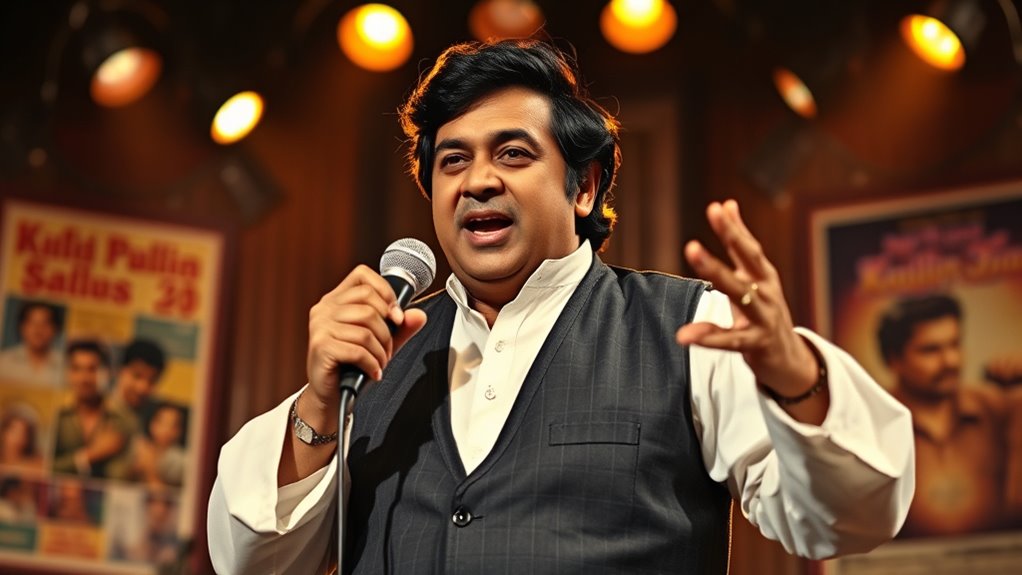
Kishore Kumar’s journey in Bollywood is a tribute to his multifaceted talent and unwavering passion. You see, he started with humble beginnings, appearing in *Shikari* (1946), thanks to his brother Ashok’s help. Between 1946 and 1955, he acted in 22 films, but most flopped, and he wasn’t truly satisfied. His interest in acting grew after hits like *Ladki* and *Baap Re Baap*, yet singing remained his true calling. Despite his acting efforts, Kishore often felt coerced into the profession. His real passion was singing, which eventually overshadowed his acting career. He carved a unique space in Bollywood, blending acting and singing, but it was his voice that truly defined his legacy. His journey reflects a relentless pursuit of his authentic self, beyond the constraints of the industry. His versatile talent and dedication helped him become one of the most celebrated playback singers in Indian cinema history. Additionally, understanding the state-specific tax laws that impacted his earnings may have influenced his financial decisions over his career.
KL Saigal: The Pioneer of the Singing-Acting Realm
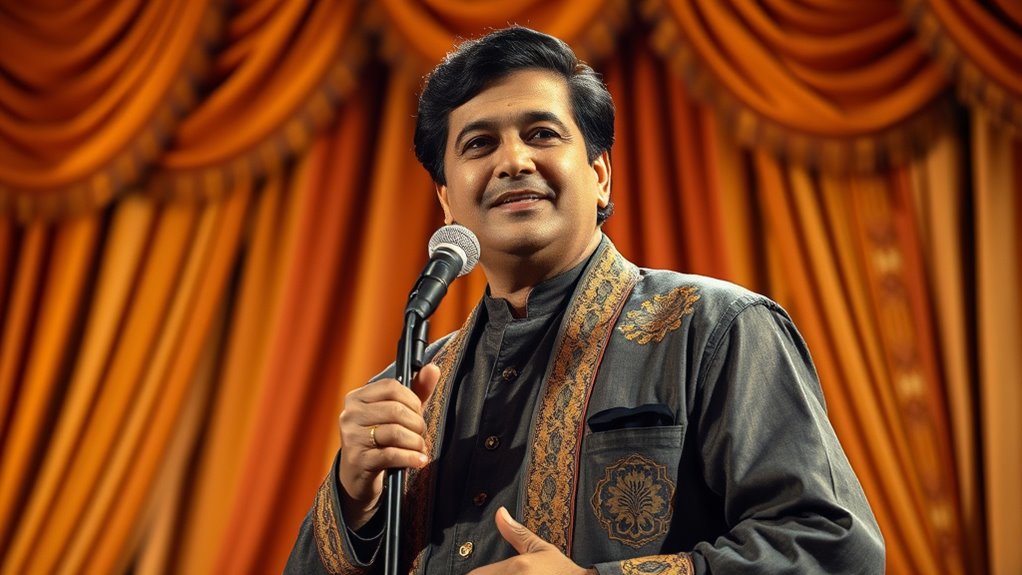
You’ll see how KL Saigal balanced singing and acting, setting a standard for future stars to follow. His iconic performances and soulful voice left a lasting impact on Indian cinema. As a pioneer, his legacy continues to influence both music and film to this day. His unique voice and on-screen presence established the foundation for future generations of Indian playback singers and actors, highlighting the importance of dynamic communication exercises for couples in creating authentic performances. Furthermore, his contributions helped shape the early development of integrated musical storytelling in Indian cinema, inspiring innovative approaches to storytelling and performance. Additionally, his contributions helped shape the integration of arts and technology, inspiring innovative approaches to learning and skill development in the arts. This evolution underscores the significance of technological integration in arts in enhancing artistic expression and audience engagement.
Early Singing-Acting Balance
K. From the beginning, K. L. Saigal demonstrated a remarkable balance between singing and acting. You can see how he shifted smoothly from his early career as an insurance agent to the silver screen, debuting in 1932. His breakthrough in “Chandidas” in 1934 showcased his ability to fuse powerful singing with compelling acting. Saigal’s voice, rich with emotion, became an extension of his character, elevating his performances in films like “Devdas” and “Tansen.” You notice how his singing wasn’t just a musical interlude but an integral part of storytelling. This harmony between singing and acting set Saigal apart, establishing a standard for future stars. His talent for bringing songs to life on screen made him a pioneer in the seamless integration of music and acting. His early films also demonstrated how his natural acting talent complemented his vocal performances, making him an enduring icon. Additionally, his mastery of performance integration helped define the ideal balance between singing and acting that many successors aspired to emulate.
Influence on Future Stars
K. Saigal’s legacy profoundly shaped future stars by establishing the singing-acting archetype. As the first male superstar, he set the blueprint for blending musical talent with acting skills. His unique style, developed without formal training, inspired artists to embrace authenticity and individuality. Saigal’s collaborations with top composers created iconic songs that continue to influence Bollywood’s musical landscape. He broke barriers by merging classical, folk, and cinematic music, normalizing the singing-actor role. His cultural impact encouraged countless aspirants to pursue dual careers, inspiring a new generation of musical actors. The following table summarizes Saigal’s key influences:
| Influence Area | Impact | Future Implication |
|---|---|---|
| Pioneering Star | First Bollywood singing-actor | Model for future musical stars |
| Artistic Style | Emotional depth, authenticity | Emphasis on individuality |
| Collaborations | Actor-composer synergy | Standard in film music production |
| Cross-Disciplinary Art | Merging music and acting | Integrated storytelling approach |
| Cultural Legacy | Inspiration for generations | Foundation for musical melodrama |
His notable films often showcased his ability to convey deep emotion through song and performance, which further cemented his influence on future generations.
Iconic Performances and Legacy
K. You can’t discuss Saigal without recognizing his iconic performances and lasting legacy. His breakthrough in “Chandidas” (1934) and superstardom with “Devdas” (1935) set new standards in Indian cinema. You’ll notice his unique voice—a soulful blend of baritone and soft tenor—that captivated audiences despite primitive recording tech. You can see his dedication to live singing on screen, which added authenticity to his performances and influenced future actors. His emotional singing style and compelling on-screen presence made him a cultural icon. Saigal acted in 36 films, leaving behind a timeless musical and cinematic legacy that continues to influence generations. His songs remain popular today, and his pioneering work in singing and acting established a benchmark for future stars. Saigal’s contributions transformed Indian cinema, securing his place as a true legend. His influence extended beyond his lifetime, inspiring countless artists and shaping the future of Bollywood music, especially through his innovative singing-acting techniques. His mastery of musical expression allowed him to connect deeply with audiences, setting a standard for emotional storytelling in Indian film. Additionally, his ability to seamlessly combine musical talent with acting set a new paradigm for performers in Indian cinema. Born on April 11, 1904, in Jammu, his impact can still be felt in contemporary performances and musical compositions.
Suraiyya and Noor Jehan: Icons Who Bridged Music and Cinema
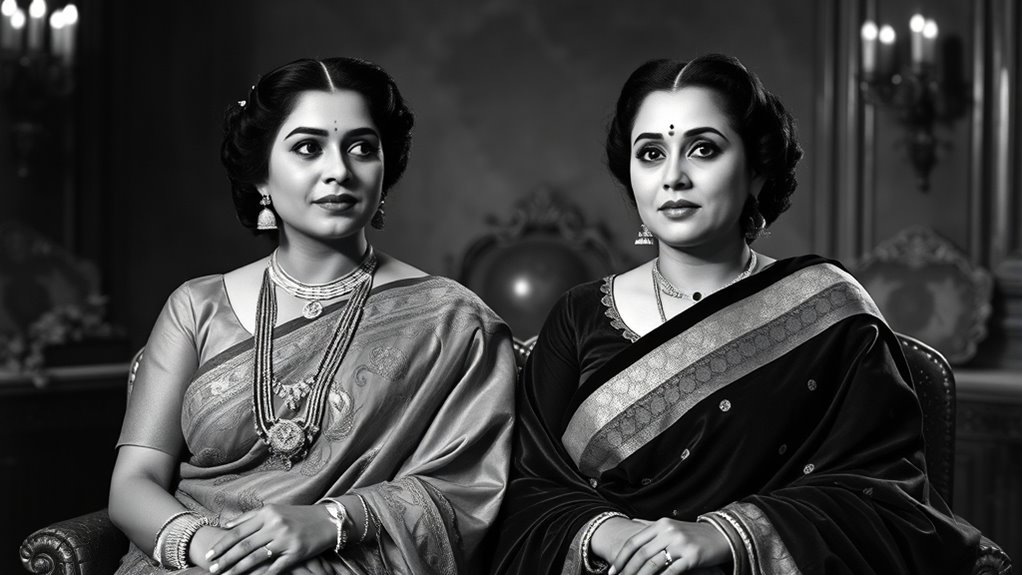
Suraiyya and Noor Jehan stand out as two legendary figures who seamlessly bridged the worlds of music and cinema, redefining what it meant to be both a singer and an actress in South Asian film industries. Suraiya, starting as a child artist, gained fame with her dual talents, acting in over 70 films and singing hundreds of songs, often as her own playback singer. Her collaborations with top music directors and her emotional performances made her a beloved icon until her retirement in 1963. Her films, such as “Mr. Lambu,” “Diwana,” and “Mirza Ghalib,” showcased her acting versatility and musical talent. Noor Jehan, initially a child prodigy, built a remarkable career as both a leading actress and acclaimed playback singer, recording thousands of songs in multiple languages. Her influence spanned pre- and post-partition India and Pakistan, cementing her status as the “Malika-e-Tarannum” and an enduring musical legend. Additionally, both artists navigated the challenges of the evolving film and music industries, and their innovations in blending music and cinema continue to inspire contemporary artists. Their ability to combine acting and singing set new standards in entertainment and broadened the scope of what artists could achieve in their careers. Leaving enduring legacies, they continue to influence generations of performers worldwide.
Modern Day Melodists: Ayushmann Khurrana and Farhan Akhtar
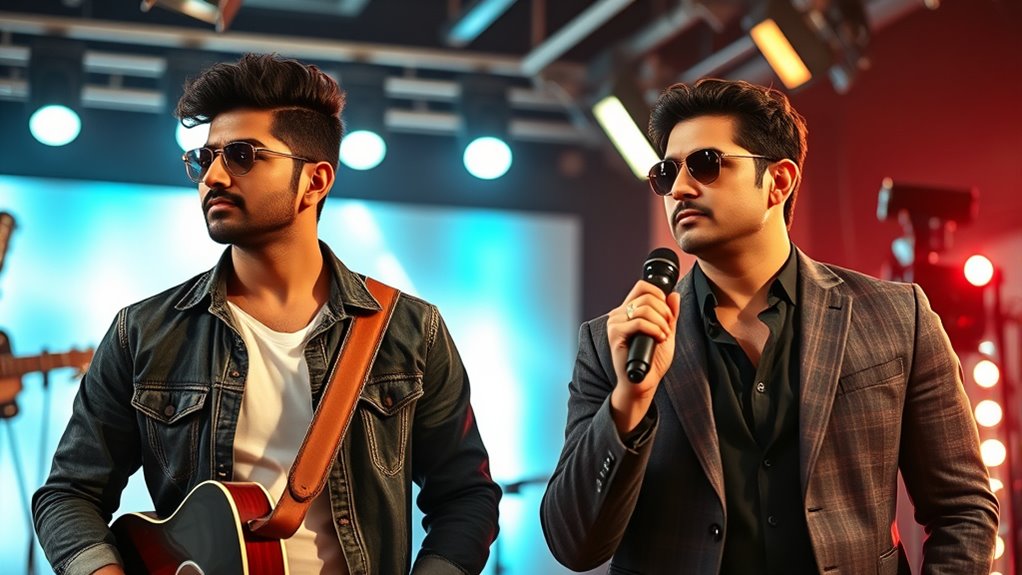
You can see how Ayushmann Khurrana and Farhan Akhtar seamlessly shift from music to acting, leveraging their musical talents for success on screen. Their ability to combine musical versatility with acting skills helps them stand out and take on diverse roles. This blend of talents not only boosts their careers but also enriches Bollywood’s storytelling landscape. Embracing multi-functional talents allows them to adapt and excel across various facets of entertainment. Additionally, their journey reflects how professional development in multiple areas can open up broader opportunities in the industry.
Transition to Acting Success
Modern-day singers like Ayushmann Khurrana and Farhan Akhtar have successfully shifted into acting by leveraging their musical backgrounds and charismatic presence. Their journeys began with early careers as radio jockeys, VJs, and theater performers, helping them build confidence and stage presence. Their film debuts, like Khurrana’s “Vicky Donor” and Akhtar’s “Rock On!!,” marked the start of their acting careers, though with initial struggles. Breakthrough roles in films like “Andhadhun,” “Badhaai Ho,” and “Bala” cemented their reputation, showcasing versatility and social relevance. Their success is driven by a mix of talent, dedication, and the ability to connect emotionally with audiences. They continue to evolve, blending musical ventures with acting to leave a lasting impact on Bollywood’s landscape. Their early experiences in theater and college festivals laid a strong foundation for their acting careers. Additionally, their performance skills have been honed through live performances and extensive training, enabling them to adapt seamlessly to diverse roles. Furthermore, their engagement with yoga and wellness practices has helped them maintain focus and emotional balance amidst demanding schedules.
Musical Versatility Benefits
Ayushmann Khurrana and Farhan Akhtar demonstrate how musical versatility can considerably enhance a performer’s career in Bollywood. Their backgrounds in music give them an edge, allowing them to explore diverse genres like Punjabi, Haryanvi pop, rock, and fusion. Khurrana’s viral singles and regional projects expand his reach, while Akhtar’s band and soundtrack work showcase his ability to blend styles, making their music resonate with varied audiences. This versatility not only boosts their popularity but also helps them connect with both traditional and modern fans. Their musical skills open doors to lead roles in musical films and increase media attention. Ultimately, their dynamic range and genre-crossing ventures position them as influential artist-singers, inspiring others to embrace multi-disciplinary talents in the industry.
Actor-Singers in Bollywood: Kunal Kemmu and Alia Bhatt
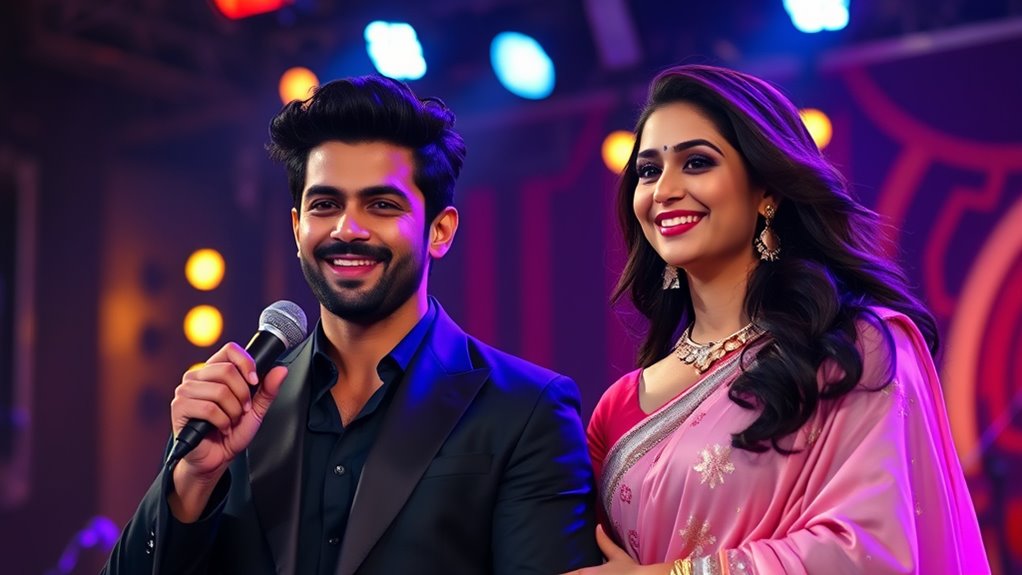
- Kemmu’s shift from child artist to OTT star
- Alia’s recognition as a versatile actress and singer
- Both exploring diverse genres in their careers
- Their recent projects emphasizing their multifaceted talents
Transitioning Talents: Atif Aslam and Ali Zafar’s Acting Ventures
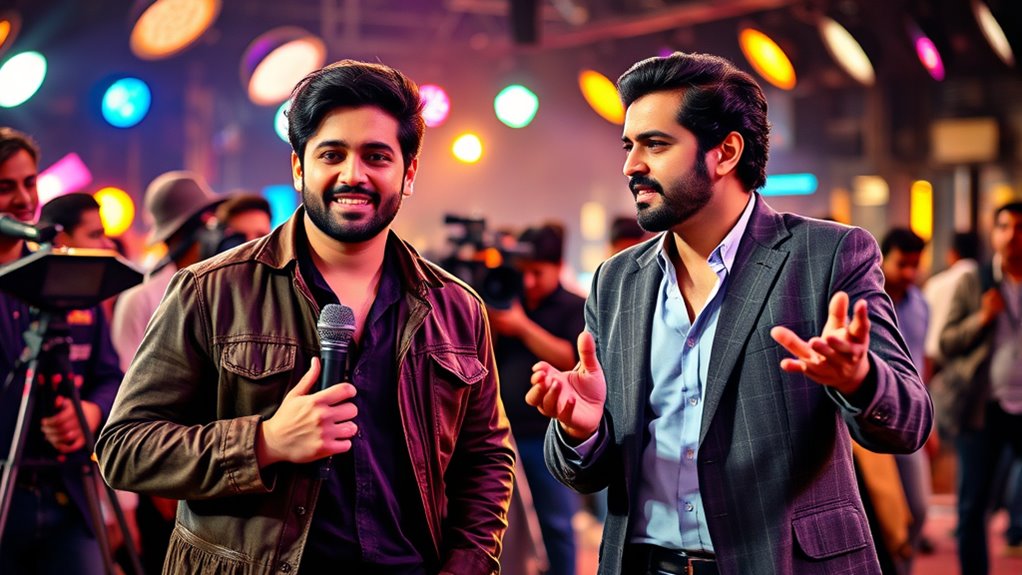
You might notice that both Atif Aslam and Ali Zafar began their acting careers with noteworthy debut films that drew mixed reviews. While Atif’s role in *Bol* was praised for its depth, his television work has also received positive feedback, whereas Ali’s performances in films like *Tere Bin Laden* have been appreciated for their charm. Their shift shows how their acting ventures have resonated differently with audiences and critics across their careers. Additionally, their careers exemplify how recognizing angel numbers can influence personal and professional growth in unexpected ways. Their journeys also highlight the importance of market research in selecting projects that align with their evolving talents and audience preferences.
Acting Debuts and Films
- Atif’s initial focus on serious dramas and TV projects
- Ali’s early success with comedy, action, and diverse genres
- Their strategic choices reflect personal brand and genre preferences
- Both continued music careers alongside their acting pursuits
Critical and Audience Reception
When evaluating the acting ventures of Atif Aslam and Ali Zafar, it’s clear that their progression from music to film has garnered mixed critical and audience responses. Atif’s debut in Bol received mixed reviews; critics praised his natural presence but pointed out limited acting skills, with no awards earned. Audiences, especially youth, appreciated his sincerity and social message, boosting his fan support. Conversely, Ali Zafar’s debut in Tere Bin Laden was praised for humor and charisma, solidifying his versatility. Critics found his dramatic range somewhat limited, but audiences remained supportive, and box office results were promising. These trends highlight how pre-existing fame influences reception, often favoring familiarity over acting depth. The following table summarizes key points:
| Aspect | Critical Reception | Audience Reception | Career Impact |
|---|---|---|---|
| Atif Aslam | Mixed reviews, limited acting range | Supportive, youth-centric | More TV roles, desire for depth |
| Ali Zafar | Praised for charisma, mixed dramatic roles | Continued fan support, positive feedback | Steady film career, versatility |
Challenges Faced by Singing-Actors in Balancing Careers
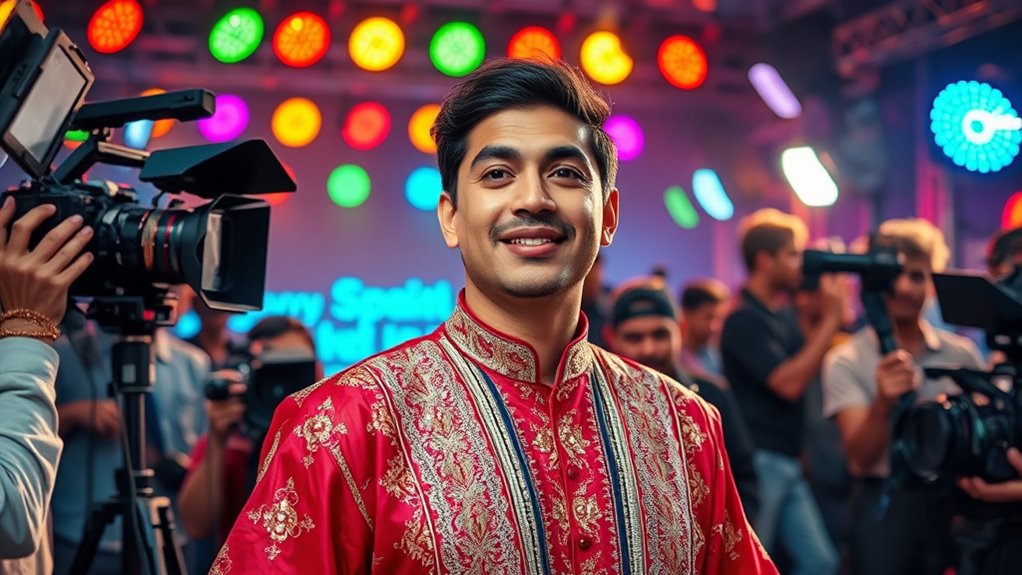
Balancing a singing and acting career presents numerous challenges that can strain even the most talented performers. Limited opportunities and typecasting often confine singers to roles highlighting their vocal talent, making it difficult to showcase versatility. The intense competition in Bollywood, with established actors vying for similar roles, adds pressure. Cultural perceptions can also hinder acceptance, with some viewing singers as less serious actors. Additionally, adapting to acting techniques and dialogue delivery requires significant effort.
Balancing singing and acting involves overcoming typecasting, intense competition, cultural biases, and mastering new acting skills.
- Managing time effectively between singing and acting schedules
- Prioritizing roles and projects for both careers
- Maintaining vocal skills while acting
- Steering public perception and expectations in both fields
Success Stories: Aamir Khan and the Singers Turned Actors Club
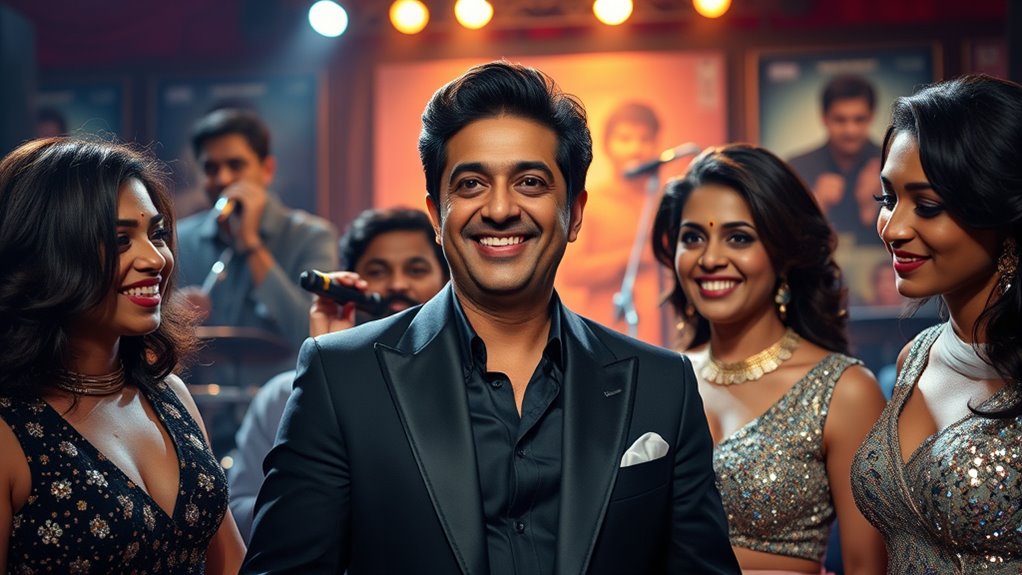
The journey of actors like Aamir Khan exemplifies how some performers successfully bridge the gap between music and acting, creating a distinct niche in Bollywood. Unlike many singers-turned-actors, Aamir’s career started with acting at age eight, and he gained fame with *Qayamat Se Qayamat Tak*, which made him a star. His early roles earned critical acclaim, earning him the National Film Award – Special Jury Award. Aamir’s family connections to film music influenced his career, but he established himself as an actor first, blending his craft with creative control. His films often featured memorable soundtracks, strengthening his association with music. His success in blockbuster hits like *Lagaan* and *Raja Hindustani* cemented his reputation as a perfectionist and a pioneer, setting him apart from the singer-turned-actor club.
The Dual Role: How Singing Enhances Acting Opportunities
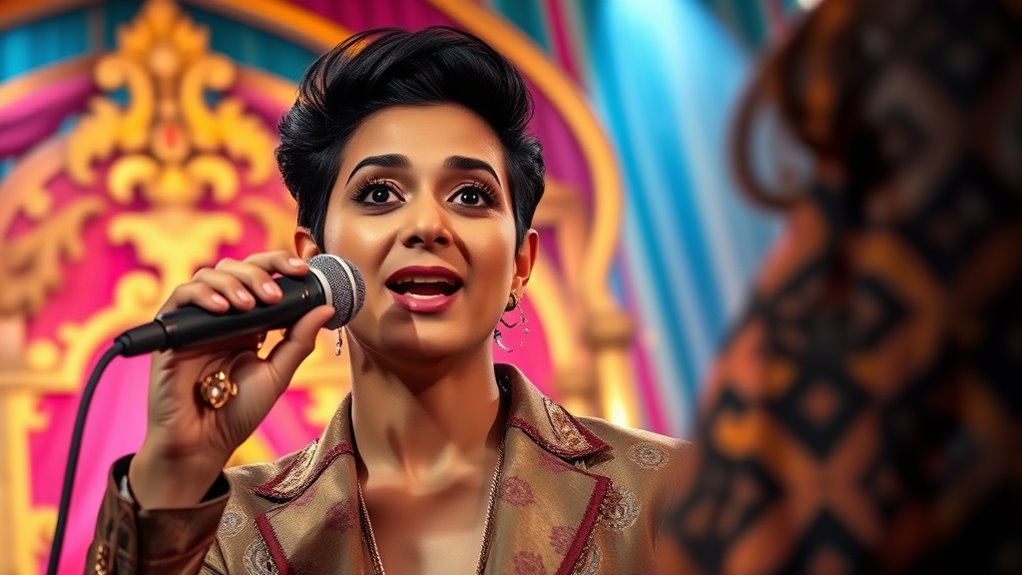
Singing can substantially boost an artist’s chances in the acting world by leveraging their existing fan base and showcasing their versatility. Your popularity from music helps attract audiences and makes casting directors more confident in your appeal. Plus, your musical talents open doors to roles that require singing, expanding your opportunities. Singing also builds an emotional connection with viewers, which enhances your acting depth. Your stage presence and confidence gained from live performances translate well on screen, making your progression smoother. Additionally, your recognition in the music industry gives you a crossover appeal that broadens your reach.
- Leverages existing fan base for quick recognition
- Opens doors to musical roles and performances
- Builds emotional resonance with audiences
- Strengthens stage presence and confidence
The Impact on Career Longevity and Industry Dynamics
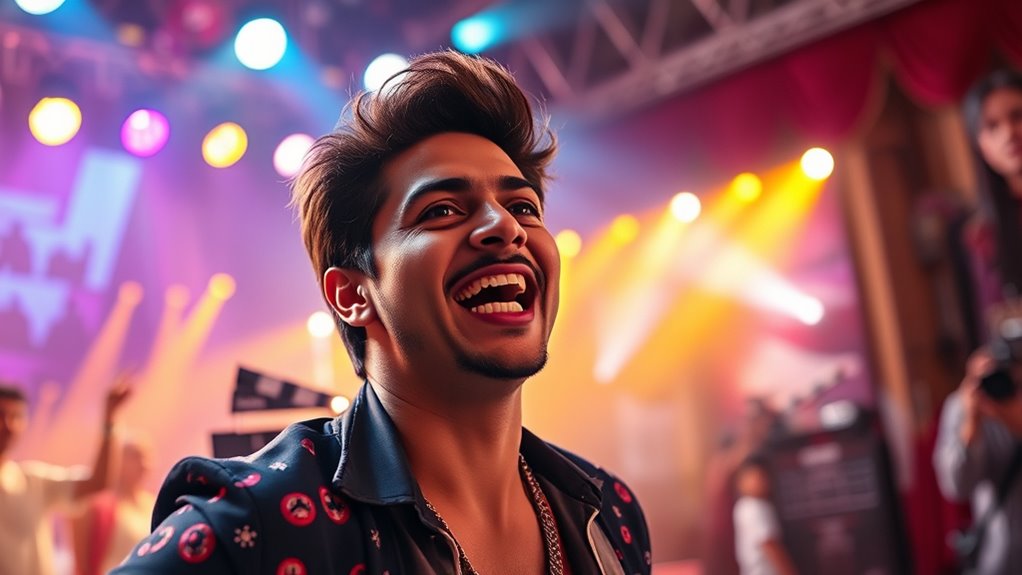
Industry dynamics in Bollywood are constantly shifting, directly impacting the career longevity of singers and actor-singers alike. The rise of new voices shortens their shelf life, forcing you to reinvent yourself constantly. Increased competition from fresh talent makes it harder to stay relevant, so adaptability is key. Singers who diversify—by acting or developing new skills—can extend their careers and stay in the industry longer. For actors with musical talents, singing can boost marketability, but the pressure to maintain relevance remains high. Changing consumer preferences and the emergence of new talent challenge your longevity, emphasizing the importance of networking, trend adaptation, and continuous learning. Ultimately, industry resilience depends on your ability to evolve with these shifting dynamics.
Frequently Asked Questions
How Do Singers Prepare for Acting Roles in Bollywood?
You prepare for acting roles by building a strong foundation in vocal training, mastering diction, and practicing emotion conveyance. You develop acting skills through dialogue delivery, facial expressions, and scene practice. Regular performances boost your confidence, while understanding film production helps you adapt. Collaborating with industry professionals and using social media for self-promotion also prepares you for the demands of Bollywood acting, making you more versatile and ready for on-screen roles.
What Are the Common Challenges Singers Face When Acting?
Facing acting challenges is like stepping into unfamiliar territory. You often lack formal training, making it tough to master emotional depth and dialogue delivery. You might get limited roles and feel the pressure to perform well, all while juggling your singing career. Industry biases and fierce competition can also block your path. To succeed, you need to adapt quickly, learn new skills, and build your confidence on this new stage.
Can Singing Improve an Actor’S On-Screen Performance?
Singing can definitely improve your on-screen performance. It enhances your vocal control, emotional expression, and physical endurance, helping you connect better with your audience. Training in singing boosts your confidence and adds depth to your character portrayal. The physical and psychological benefits, like better posture and reduced stress, translate into a more authentic, engaging presence. Overall, singing enriches your expressive range, making your acting more compelling and believable.
How Do Bollywood Producers View Singer-Actors for Casting?
Bollywood producers see singer-actors as valuable assets because their existing fan base can boost a film’s popularity. They appreciate the versatility singer-actors bring, which can enhance marketing and cross-promotional efforts. However, they also consider the challenges of acting skills. Overall, producers view singer-actors as promising for increasing box office success and cultural relevance, provided they can convincingly shift into acting roles.
What Impact Does Acting Have on a Singer’S Musical Career?
You might find that acting boosts your musical career by increasing your credibility and expanding your audience. It can open doors to new opportunities, like film soundtracks, and help you develop a stronger stage presence. Plus, acting can bring in extra income and endorsements. However, balancing both careers can be challenging, requiring good time management. Overall, acting can enhance your reputation and help you reach more fans.
Conclusion
You’ve seen how singing and acting intertwine beautifully in Bollywood, turning singers into legendary actors and vice versa. This blend isn’t just a trend; it’s a force that shapes careers and defines eras. When you witness these talented individuals juggle both worlds, it’s like watching a symphony of talent that could outshine even the brightest stars. Truly, their dual mastery leaves an indelible mark on the industry’s vibrant tapestry.
